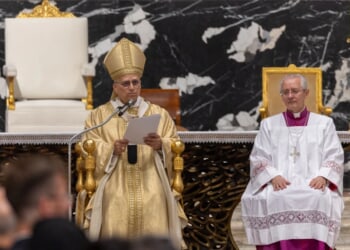Tchaikovsky is known for symphonies, ballets, concertos, and operas—that ought to be enough. He is not especially known for chamber works. I always thought his best chamber work was the Piano Trio in A minor. But I recently had the chance to revisit the Sextet in D minor, “Souvenir de Florence,” and now I’m not sure. Call it a tie.
I begin my new episode of Music for a While with an excerpt from the sextet. And I say a little about the nickname, “Souvenir de Florence”:
Is [the sextet] an Italian piece, so to speak, on the order of Tchaikovsky’s Capriccio italien? I would say not. The sextet acquired that nickname because the composer sketched out one of the themes while visiting Florence.
The Capriccio italien, a fantasy for orchestra, is replete with Italian tunes. Tchaikovsky wrote it under the inspiration of a trip to Rome. The title is curious: an Italian noun and a French adjective. Why not “Capriccio italiano” or “Caprice italien”? In any event, titles do not demand logic.
Before I leave Tchaikovsky, and his caprice, let me say something about cultural appropriation—one of the hang-ups of our age. You know another word for “cultural appropriation”? “Culture.”
At the Salzburg Festival this summer, I did a podcast with Julian Prégardien, the German tenor, who had interesting things to say about Mozart, among other composers. I quote him in this latest Music for a While.
Prégardien is a well-known Don Ottavio, in Don Giovanni. Lots of people think that Ottavio is a thankless part (despite the two great arias)—weak, bland, namby-pamby. Here is Prégardien on the subject:
I would say the image of Don Ottavio reveals a problem of our modern society, because to say that a supportive man is weak is something we should have overcome in the twenty-first century.
Don Giovanni should not be adored, because he’s the bad guy. Don Ottavio’s the good guy. He is husband material. Mozart and Da Ponte [the librettist] are holding up a mirror to society. They are saying, “I bet you like Don Giovanni more than you do Don Ottavio. You better think about that.”
Yes, one had better.
I might mention one more thing, here on the blog. In this new episode, I include a Chinese art song, by Huang Tzu. He lived from 1904 to 1938 (a short life). He came to the United States to study at Oberlin College and then Yale. As some readers may know, I am from Michigan, and we regarded Oberlin as our Midwestern Juilliard—along with the universities of Indiana and Michigan.
American education has meant a lot to people around the world. This is something that Americans can take satisfaction in, I think.
At any rate, if you are in the mood for a music podcast, that latest Music for a While is, again, here.

















